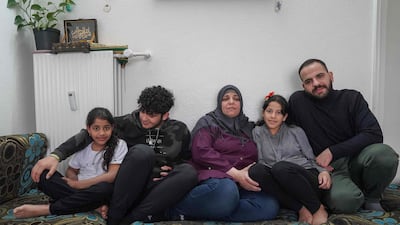Protests against Denmark's decision to declare Syria safe enough for refugees to be sent home were taking place across the country on Wednesday.
A crowd of people holding heart-shaped placards filled up a central square in Copenhagen in one of the rallies organised by Amnesty International and other groups in 25 Danish cities.
At least 200 Syrians have had their residency permits revoked since mid-2020 after Denmark decided that Damascus was safe enough for their return.
The Syrian capital is under the control of President Bashar Al Assad’s regime.
“No one should be deported to the same dictator that they fled from,” said Natasha Al Hariri, director of Danish Refugee Council Youth.
“Young people who have fled to Denmark, and who after a few years in the country have begun to dream and think in Danish, are now facing another violent trauma caused by the Danish government’s current deportation policy.”
Under growing pressure from human rights activists, Denmark on Tuesday announced it would repatriate 22 Danish citizens from camps in Syria they were held in because of their links with ISIS fighters.
The group is made up of three Danish women and their 14 children, as well as five other children without their mothers.
Danish Foreign Minister Jeppe Kofod said the humanitarian situation at the camps had deteriorated, with a shortage of food and medical care.
But the government is pushing ahead with plans to return refugees to Damascus.
The Danish parliament voted this month to back the decision, which is the only such move by an EU member state.
Thousands of people were expected at Wednesday's demonstrations, four weeks after a similar protest took place outside the Danish Parliament.
Niels Rohleder, a spokesman for the Danish Institute Against Torture, said thousands were gathered in Copenhagen alone while another 27,000 had signed a petition on the subject.
Anger after Damascus declared safe for refugees
Protests were being organised by the Danish Association for International Co-operation alongside Amnesty and the Refugee Council, and an activist called Haifaa Awad, who was born in Damascus and moved to Denmark in 1993.
She returned to Syria to become a doctor in 2015, but returned to Denmark after only a week because of the civil war.
“In Damascus, the Assad regime has consolidated its power now, not with bombs, but with horrific human rights violations, extremely arbitrary arrests and extensive torture laboratories,” she said.
“Can our Prime Minister Mette Frederiksen guarantee the lives of Syrian refugees when they cross the border when the UN and the United States cannot?”
Under Danish law, temporary residence permits are issued without an end date in cases where the country of origin is in the midst of serious violence.
But they can be revoked once conditions in the refugee’s home country are deemed to have improved.
“It is difficult to comprehend how the Danish authorities have reached the conclusion that Damascus and the surrounding area are safe enough for asylum seekers to return,” said Dan Hindsgaul, acting secretary general of Amnesty International Denmark.
“Our research shows that Syrians who have been send back are routinely subjected to interrogation by Syrian security forces.
“Wanting to send people back to such a risk is contrary to Denmark’s human rights obligations.”
Refugees cannot be expelled by force, but are urged to leave voluntarily or be placed in an administrative centre until further notice.
About 35,500 Syrians live in Denmark, more than half of whom arrived in 2015.


